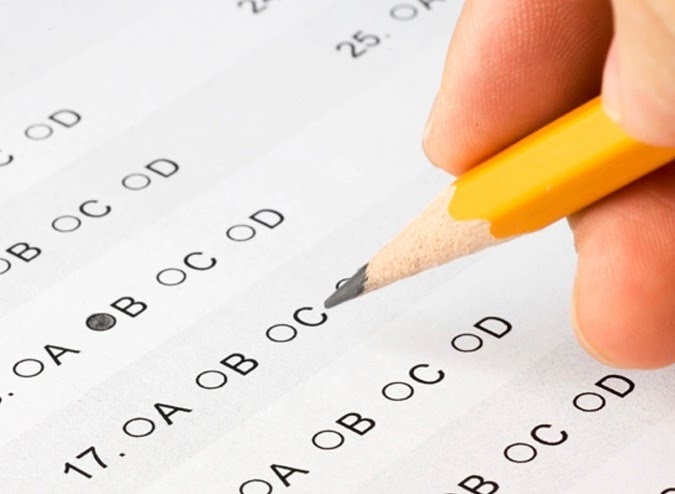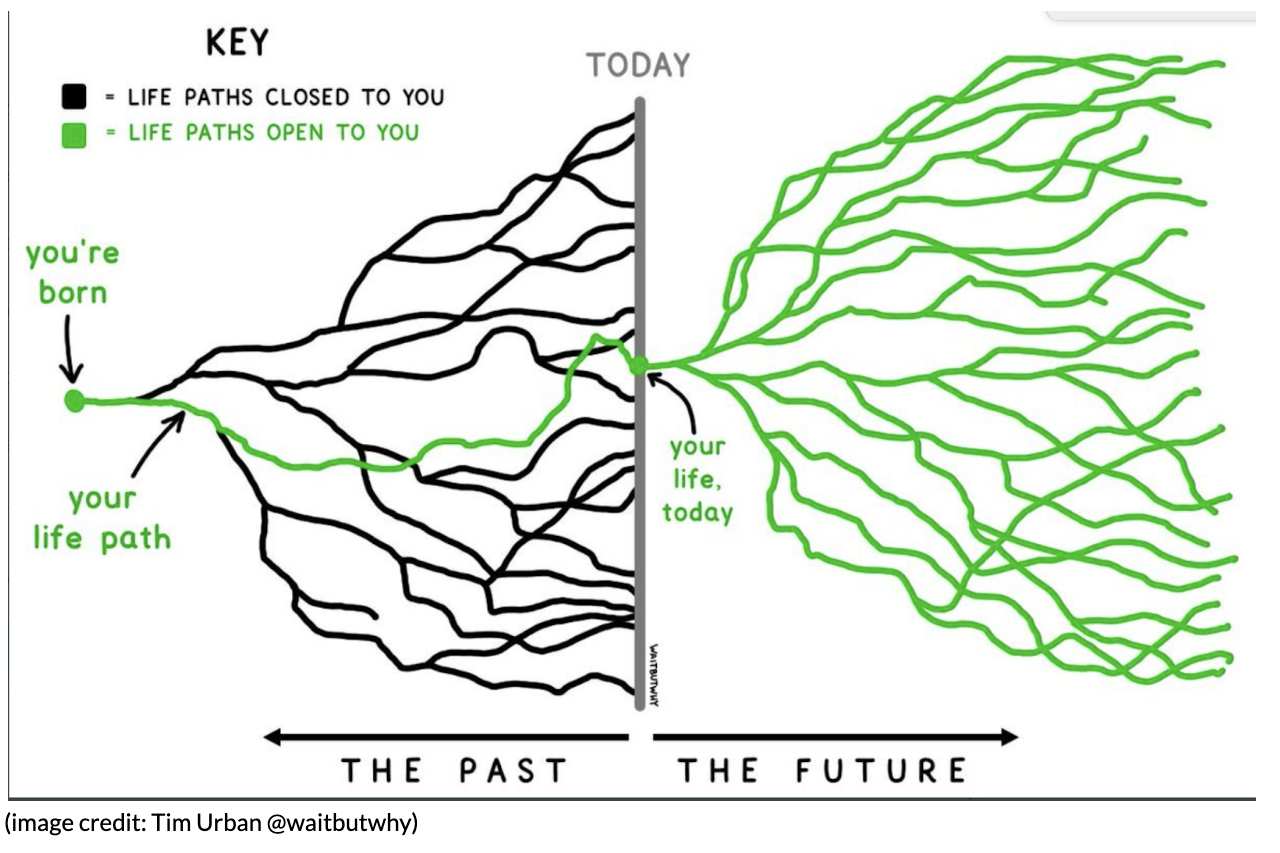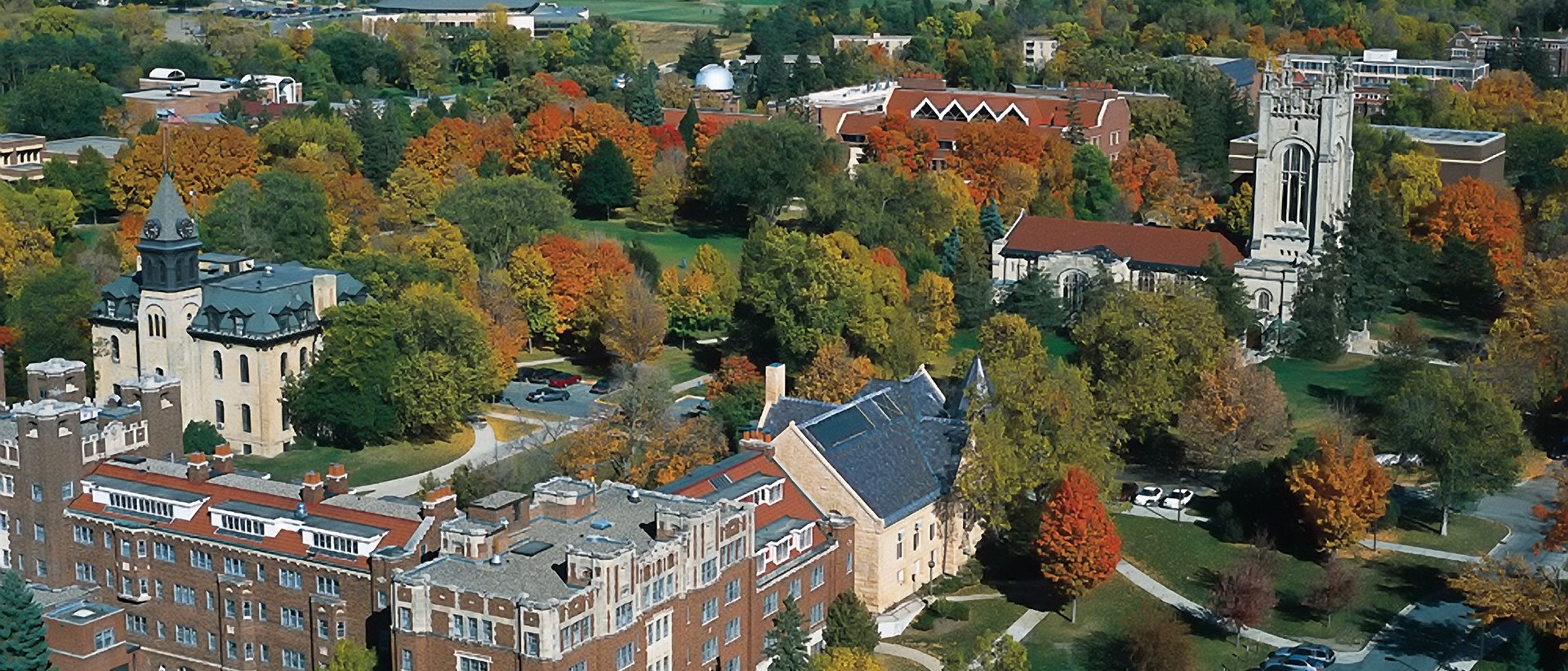To SAT? Or, to ACT? How do you pick?
The stress around standardized testing has not gone away despite the shifts that many schools have made toward test-optional admissions. In fact, for some students, the stress around standardized testing seems to have only increased as they consider how to maximize their scores to submit to schools that are test-optional (particularly when those schools seem to have a preference for students to submit high test scores). The specifics around whether “test-optional” really means OPTIONAL is a subject for another blog post. Today, let’s talk about the SAT and the ACT, how they are alike, how they diverge, and how you might be able to choose which test to take without going through the onerous challenge of sitting for both.
First, at the root, the SAT and the ACT really are very similar tests.
Both the SAT and the ACT focus on testing a student’s ability in the key areas of reading, writing, and math. They both ask students to solve problems, read passages, select among multiple-choice answers, and interpret information at a similar level of difficulty. Both the SAT and the ACT provide a standardized means of comparing students despite vastly different high school curriculums and experiences. Contrary to some outdated assumptions, neither the SAT nor the ACT has a “guess penalty” – which means that students should make a guess and answer every question on the test.
The really good news? Most students who take both tests receive a pretty similar score (percentile-wise) on each one.
Despite this, there are some key differences between the SAT and the ACT which might help students decide which test is the “right” test for them.
First, the ACT is a faster-paced test – students are required to answer more questions, per minute, on the ACT than they are on the SAT.
For example –
ACT math = 60 questions, 60 minutes (1 minute per question)
SAT math = 58 questions, 80 minutes (1:23 per question)
ACT English = 75 questions, 45 minutes (36 seconds per question)
SAT writing & language = 44 questions, 35 minutes (48 seconds per question)
ACT reading = 40 questions, 35 minutes (52 seconds per question)
SAT reading = 52 questions, 65 minutes (1:15 per question)
* Note: This applies to the paper-based SAT. The digital SAT (releasing in 2024) will be a shorter test.
SO – If you are a quick processor, someone who often finishes tests in school ahead of the allotted time, the ACT might be a better choice for them. If you prefer to work more slowly through information, or often find yourself using every minute of allotted time, the SAT might be a better fit.
Second, the ACT has a science section. (The SAT does not!)
The science section of the ACT does not really test science concepts. It is really more about logic problems and graph reading. Take a look at this real ACT science question:
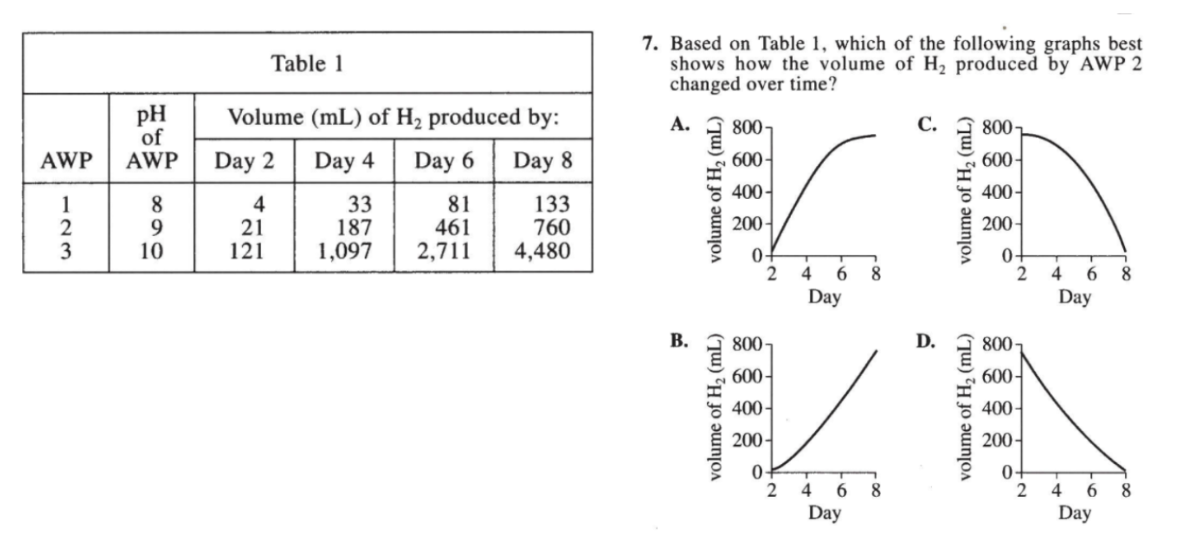
What do you think? Does the graph make your head spin? Or does this look like an easy question? (The answer is “B”.) If graph reading is not your thing, no worries, the SAT might be the test for you!
The SAT reading passages tend to be a bit longer, and tricker.
Do you love to read? How’s your vocabulary and ability to parse difficult passages? If you are a bookworm, or someone who loves getting lost in words, the SAT might be a more appealing test for you. Take a look at this real SAT reading passage:

What did you think? If this makes sense to you, maybe the SAT is a good fit test! If you felt lost here, perhaps consider the ACT.
Finally, the SAT has both a “calculator” and “no calculator” math section (only until 2024). For now, the SAT has one math section where students must rely on their mental math abilities. If mental math is not your thing, consider the ACT. However, when the SAT becomes all digital in 2024, the no calculator math section is going away.
The good news? Most of these differences between the tests will continue to be true, even after the SAT switches to digital testing in January 2024. Use some of these guiding questions to decide which test might be a better option for you! And no matter what you select, practice practice practice! There really is no better way to prepare than to be prepared!
It Always Works Out.....
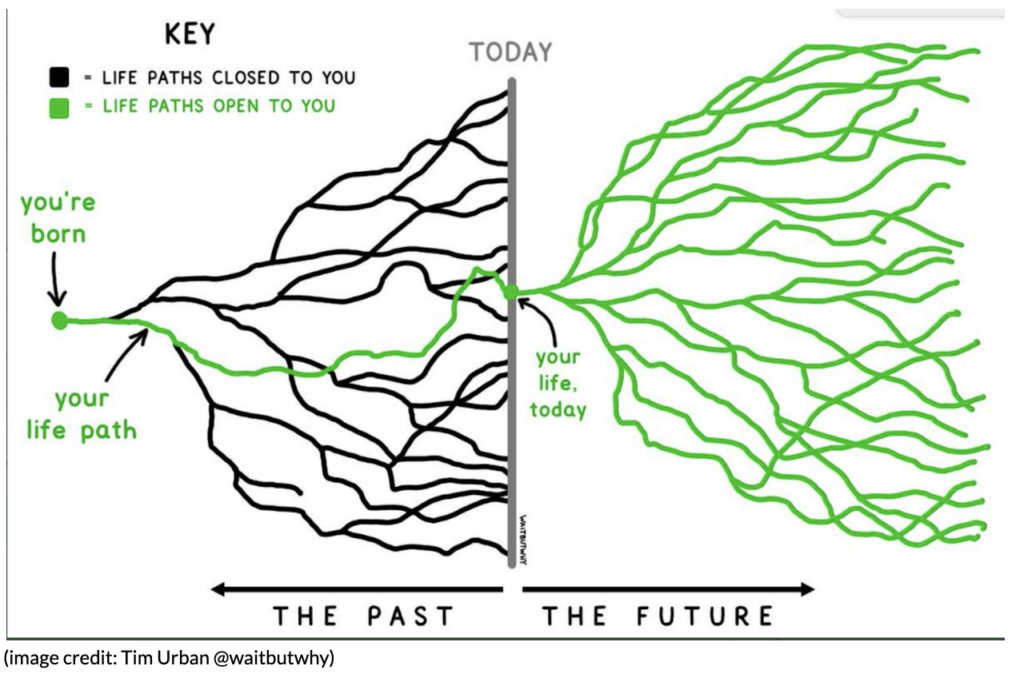
Take a look at this image. No matter who you are, or how old you are, your “today” is just the beginning of an infinite number of possibilities and branching paths.
Having worked as a college counselor for almost two decades, I can say for certain that many students look at their college decision as one of the most influential branches on the path that makes up their life up to that point. Often, when I sit down to meet with a student for the first time in 10th or 11th grade, they have a very specific vision of this path – what school they will attend, what they will study, and where their life will go from there.
Unfortunately, the reality of college admissions is that often these visions (this is the “dream school”; this is the “most perfect major”) do not play themselves out in the process. In the face of some schools receiving more than double the number of applications they received only a few years ago, it is more and more difficult to latch a set of hopes and dreams onto a single school.
But I truly believe that’s exactly as it should be. There should never be just one dream school, or one perfect program. The world is full of infinite paths and options – things students have never imagined or even conceived. Instead of seeing only a single path through the process, I challenge students to see themselves on the green line, and to begin to imagine the vast number of possibilities that lie in front of them.
Therefore, what I most often say to students (and families) throughout the college counseling process is this: “It always works out. It just doesn’t always work out how you think it will right now.”
Consider just a few stories from the Class of 2023:
- One student applied Early Decision to a “dream school” and was deferred. The student applied to a wide selection of other schools at the regular decision deadline. Ultimately, the Early Decision school admitted the student in March. However, as the student looked at their options, there were others that felt like a better fit. Ultimately, the student enrolled at another school, one that wasn’t on the horizon as even a “high possible choice” in October.
- One student applied Early Decision to a “dream school” and was rejected. The student continued to research schools all fall and found another school, one that actually might have been a better fit for their interests and plans. The student applied Early Decision II to this new school and was admitted.
- One student applied Early Decision to a school that felt like the best fit for their planned career combining engineering and entrepreneurship. They were rejected. They applied Early Decision II to a second-choice school that also felt like a great fit for this planned future. They were also rejected. Then, the student was admitted to a program within a large public university, one that awards two B.S. degrees (one in engineering, one in business) – a program even more selective than both the ED/ED II schools.
The stories could go on. The theme is simply that the process unfolds in its own way, on its own path. As students (especially rising seniors) approach the college process and begin their applications, it is so important that they keep this fact in mind: there is not only one path (or one school). Thirty years ago, I applied to college intending to major in Biology and head from there to medical school. Instead, I wound up studying philosophy (a subject I had never even heard of before my sophomore year in college) and going into education – a path I could never have conceived at 18.
It always works out – it just doesn’t always work out how you think it’s going to right now.
AI and the Essay
It is now rare to open a newspaper or listen to a news program without some mention of AI. These discussions often have a slightly apocalyptic tone – the Terminators’ SkyNet lives! In essence, AI confronts us with a real transformation of the way we do things. And that is both hugely exciting, and scary.
Educators, too, are grappling with the implications of AI, particularly the way that ChatGPT (and alternatives such as Bard) upends assumptions about how we work. Evaluating students’ learning by asking them to write essays and exams, staples of secondary and tertiary education, now might become outdated. Asking students about the use of ChatGPT in their schools, most have told me they know others who use it for everything from basic information gathering to full-on essay writing. No one has acknowledged doing the latter themselves, and I think this reflects that students are as much at sea about this as their teachers.
When ChatGPT writes an essay, it produces content that is of higher quality than most high school students can deliver in terms of sophisticated word usage and clarity of argument. Its use might therefore be irresistible to students feeling the pressure of high expectations, busy lives, and an absence of clear guidance on the appropriateness of its use in particular fields of study and for different assignments.
As someone who loves technology but claims no education or insight into its development, I signed up for both OpenAI’s free version of ChatGPT and the more advanced GPT-4, to see what the fuss is about. Asking it to write commentaries on everything from the risks inherent in AI and obscure historical questions to why the San Jose Sharks played so badly this year (the answer turned out to be a litany of the obvious, from poor goaltending to “simply being outplayed”), it formulated answers in impeccable language, and certainly faster than I could have done.
But I think that ultimately there are three reasons why I would discourage students from using chatbots in their work with me:
- Having a chatbot do one’s work is arguably plagiarism: presenting someone else’s work as your own. As Stanford’s newly released policy on the use of any generative AI puts it, Absent a clear statement from a course instructor, use of or consultation with generative AI shall be treated analogously to assistance from another person. To quote ChatGPT directly, plagiarism is wrong because it violates academic integrity, undermines the value of original work, and is a form of dishonesty. (Colleges do recognize that there are academic spaces in which professors might well allow or even encourage students to use generative AI, including classes on the development of AI itself.)
- Secondly, for work in which we use writing to explain something or set out an argument, ChatGPT undermines learning itself. After all, learning lies not in presenting a final product for a grade, but the process that precedes it: creatively seeking out sources of information, critically weighing the validity of the information, and, after wrestling with competing ideas and conflicting evidence, using our command of language to construct an argument. Using a tool such as ChatGPT can sidestep that entire process.
- Finally, as an admission advisor, I don’t think ChatGPT will serve college applicants well in writing their essays. Admission officers look for many things in an essay, from good writing skills to critical thought, but also insight into how an individual student thinks, sees the world, empathizes with others, and might contribute to a campus community. Running one college admission question after another through ChatGPT, I was astonished at the speed and literacy with which it answered. But I was equally struck by how anodyne every answer felt. None of the responses had me in it.
I asked it, for example, to write a short essay on my identity as someone of South African descent, and ChatGPT quickly produced a well-written piece on how I have been shaped by the values of my family and culture and by the political struggles of my country. All quite true – of me and every other person who asks that question. Since it responds in broad strokes scraped from the experiences of others, it could not add anything about my unique experiences of how and where I grew up or adequately capture my distinctive voice. This is not ChatGPT failing. It is just the nature of generative AI and is what would make such an essay easy to read, but ultimately unsuccessful in its task.
In writing a college application essay, the task is not to produce the smoothest essay covering the broadest possible ground. Rather, it is to share something of what makes you uniquely and distinctively you. That can only be done by doing it yourself.
Choosing Your Courses for the Next Year
Soon, many sophomore and junior students must make choices about their courses for next year. We know the admission process at very selective colleges is based, above all, on your academic performance, and if your grades are not what the college wants to see, your chances of admission will be limited. But how do your curricular choices play out in that process?
Ideally, your college education should have both vertical depth in a single subject and horizontal breadth across many. Admission officers, especially at the most selective colleges, are trying to gauge whether your high school curriculum is equipping you, as a Harvard brochure on preparing for college described it, “with particular skills and information and … a broad perspective on the world and its possibilities.” In fact, most liberal arts colleges are not really admitting students to a particular major (there are exceptions, of course, mostly in pre-professional fields such as engineering and nursing). Thus, choices you make about your curriculum act as a mirror in which they can see your skill/aptitude for pursuing a particular academic interest, but also your curiosity and breadth of mind.
- Are you able to jump into challenging courses in your intended major and make good use of the opportunities on offer? Do you have the math training to take on engineering courses, for example? Do you have the analytical and writing skill to do well in a demanding philosophy course?
- Are you also able and curious to explore beyond your major? Are you flexible enough to see how those “other” ideas might even connect with your field and enrich it? This is as much a practical as a philosophical point. Knowledge is interconnected, and knowing something about statistics, for example, might be very useful to the prospective historian, while a pre-med’s perspective might be shaped by anthropological insights into different cultural assumptions about mind-body connections. In a rapidly changing world, you also don’t know what knowledge the future will require, or which bits of learning will start fading into obsolescence soon after graduation. Your career prospects, therefore, might depend on knowing how to learn, how to analyze critically, and how to communicate your great ideas, whether about a product you are developing or about a public policy you are promoting. You may well have developed some of these skills outside your major!
What does this mean for the courses you should choose in high school, especially if you intend to apply to selective colleges?
- Don’t specialize in high school – if you are mostly not being admitted to a major as a first year, then the fact that you avoided, for example, social science/humanities courses in high school because you intend to study data science, might be a red flag. Note that MIT and Harvey Mudd require applicants to have letters of recommendation from both a STEM teacher AND a humanities/social science one!
- Don’t choose courses because they might be easier, especially if you hope to apply to very selective colleges. Experienced admission officers know that a one-semester government class is likely not going to challenge you as much as AP US History, and that all IB math courses are not equally demanding. As Yale advises its applicants, “Pursue your intellectual interests, so long as it is not at the expense of your program’s overall rigor or your preparedness for college. Be honest with yourself when you are deciding between different courses. Are you choosing a particular course because you are truly excited about it and the challenge it presents, or are you also motivated by a desire to avoid a different academic subject?”
- Choose a course load that will show preparation in a broad academic core, because you will learn important skills and perspectives in each:
- History gives students a better understanding of how the past shapes the present and what is distinctive about our own moment. A rigorous economics course might do the same.
- English will help you write better in a global language and think more critically, while literature gives insight into other lives in different times and places.
- Foreign languages facilitate your access to a global world and to cultures that are not your own. Whether you want to be a businessperson or a physicist, being able to communicate with others and imagine different ways of being and thinking is essential.
- Mathematics not only allows you to balance your checkbook, but also to grasp new scientific discoveries, figure out the economic implications of environmental change, and understand a government’s trade policies. In short, mathematics equips you for modern life.
- Science, in a time when political freedom and environmental health are threatened by false facts and viral conspiracy theories, allows you to analyze scientific concepts and understand their consequences, and think creatively about technology.
- Finally, choose the right rigor for you. Students often ponder whether colleges care most about grades or about rigor. The stock answer is, of course, both. And if you aspire to ultra-selective colleges, this is good advice and a healthy reality check about your chances of admission. But it might not be the most useful advice for every student. NACAC, the national admission organization, counsels you to, “take the most challenging courses that are available and appropriate for you.” So, choose the toughest courses in which, with hard work, you can succeed, and then commit yourself to get as much from them as you can.
